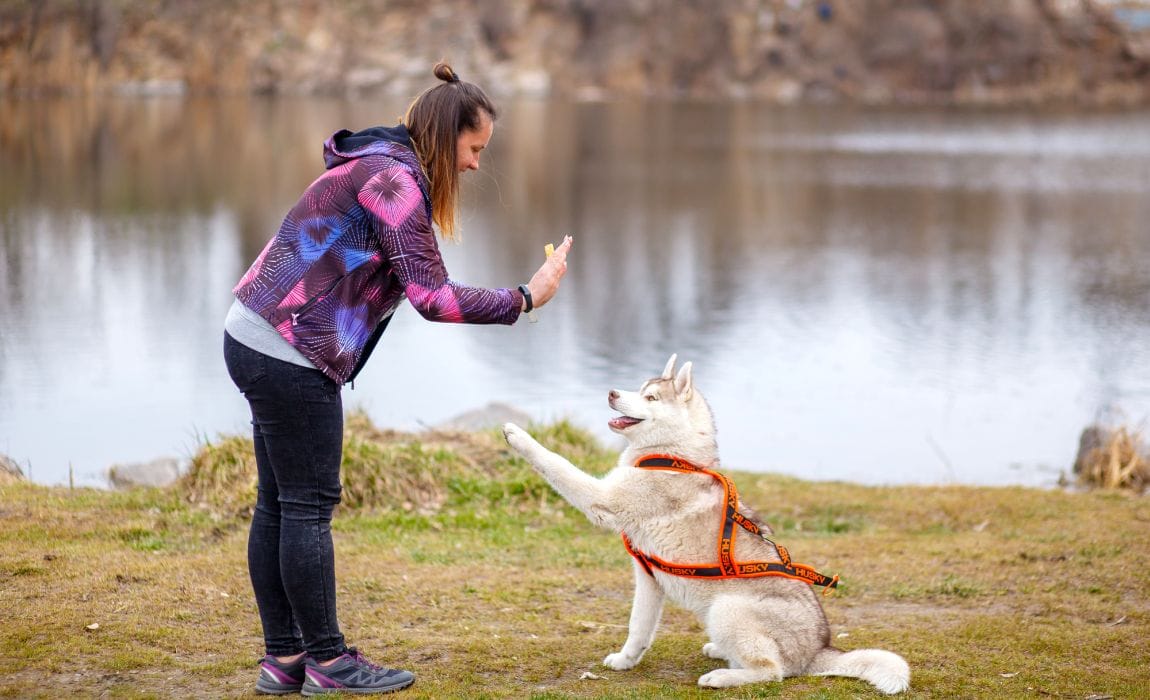Unlock Your Pet dog's Possible With Professional Training Techniques
Recognizing and utilizing your pet dog's potential is a nuanced venture that requires an extensive approach to training. By discovering specialist techniques that prioritize favorable reinforcement and efficient communication, one can cultivate a more satisfying relationship with their canine buddy. The selection of ideal tools and the application of customized training approaches play important functions in this procedure. As we examine the intricacies of canine actions and the essential elements of an organized training routine, it becomes apparent that the course to accomplishing a well-behaved pet is as much concerning the trip as it is the destination.
Recognizing Pooch Actions
Understanding canine behavior is vital for effective dog training. Dogs connect largely via body movement, articulations, and face expressions. Acknowledging these signals enables instructors to far better analyze a pet's psychological state and respond appropriately. A wagging tail could show enjoyment, however the context is vital; a rigid posture combined with a wagging tail might suggest frustration.
In addition, socializing plays an essential role fit a canine's behavior. Early direct exposure to various environments, individuals, and other animals helps establish a well-shaped character, reducing the possibility of fear-based reactions in adulthood. It is additionally important to recognize the breed features, as various breeds might display specific habits influenced by their historic features.
In addition, favorable reinforcement is a cornerstone of reliable training. Recognizing what inspires a particular pet-- be it food, appreciation, or play-- enables instructors to implement methods that urge preferred actions. Recognizing anxiety signals, such as yawning or lip licking, can also assist instructors in customizing their approach to prevent overwhelming the dog. Eventually, an extensive understanding of canine behavior cultivates a harmonious connection in between pets and their fitness instructors, paving the method for successful training outcomes.
Important Educating Devices
Reliable canine training needs a variety of devices that assist in communication and reinforce understanding. These devices can substantially boost the training procedure, making it more effective for both the fitness instructor and the pet.

Training deals with are one more vital component, acting as a tangible benefit that motivates dogs to involve and learn. Making use of training pads can additionally be useful for house-training puppies, supplying a marked location for them to ease themselves.
Moreover, training mats or designated training rooms can create a focused atmosphere, assisting pets associate particular locations with knowing. Lastly, interactive playthings can be utilized to stimulate a pet's mind, advertising cognitive development alongside obedience training. By making use of these necessary tools, fitness instructors can develop an efficient and satisfying training experience that opens a dog's full capacity.
Favorable Reinforcement Methods
A multitude of favorable support approaches can considerably boost pet training results by motivating desired habits with incentives. These techniques utilize the natural learning procedure of pets, advertising a strong bond between the handler and the family pet while fostering an Bonuses atmosphere helpful to learning.

Including play as a form of reward can better enrich training sessions. Taking part in a favored video game or supplying a plaything after a successful command not only rewards the canine but additionally enhances their enjoyment of the training process. Slowly eliminating treats as the pet learns can assist maintain their responsiveness to commands, ensuring they remain engaged without depending solely on food.
Ultimately, favorable support strategies are crucial for effective pet dog training, as they advertise finding out via an encouraging, encouraging approach that benefits both pet dog and proprietor. - Board and train Raleigh NC
Common Educating Methods
Different canine training strategies are used to accomplish desired actions and boost the bond in between pet dogs and their owners. Among one of the most common methods declare reinforcement, remote control training, and leash training.

Leash training concentrates on mentor pet dogs to stroll steadly on a leash without pulling. This is important for safety and security and control during strolls. Methods such as the 'stop-and-go' method, where the trainer quits walking when the pet draws, assist impart great chain manners.
Another typical technique is obedience training, which includes standard commands like sit, remain, and come. These commands are fundamental completely habits and can protect against unwanted activities. Each of these techniques can be adjusted to suit individual pets, considering their unique characters and discovering designs, inevitably causing successful training end results.
Structure a Training Routine
Developing a consistent training regimen is important for enhancing preferred actions in canines. A well-structured regular not just enhances discovering yet likewise helps to develop a strong bond in between the pet and the trainer.
Including range right into the training routine can keep the pet dog engaged and protect against boredom. Alternating in between various commands, methods, and works out to keep emphasis and excitement. Furthermore, consistency in commands and hints is necessary; use the same words and hand signals to stay clear of perplexing your canine.
Positive support plays a crucial role in this process. Rewarding your canine promptly after a desired actions motivates repetition of that habits. Keeping a calm and favorable ambience throughout training sessions promotes a helpful learning environment.
Lastly, be person and relentless. Development may differ, and some pets may need even more time to find out specific commands - Board and train Raleigh NC. Adapt your regimen as needed, guaranteeing it stays best site delightful for both you and your canine
Final Thought
To conclude, efficient dog training rests on a thorough understanding of canine habits, the use of essential training devices, and the application of positive reinforcement approaches. By embracing common training methods and developing a consistent training regimen, proprietors can cultivate a participating and well-mannered companion. This technique not just enhances interaction between the dog and proprietor yet also fosters a much deeper bond, eventually opening the pet's complete potential and guaranteeing an unified partnership in diverse atmospheres.